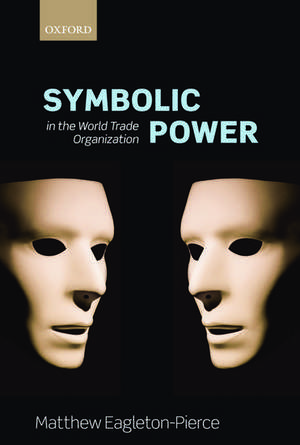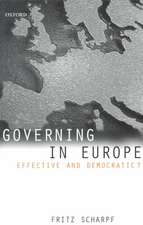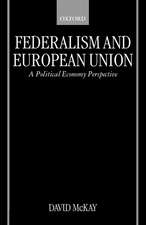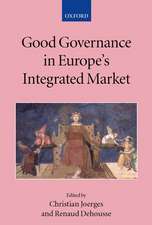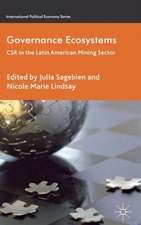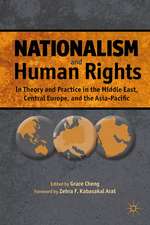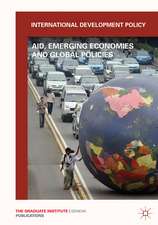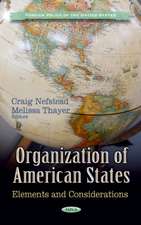Symbolic Power in the World Trade Organization
Autor Matthew Eagleton-Pierceen Limba Engleză Hardback – 12 dec 2012
Preț: 789.14 lei
Preț vechi: 1009.74 lei
-22% Nou
Puncte Express: 1184
Preț estimativ în valută:
150.100€ • 158.08$ • 124.94£
150.100€ • 158.08$ • 124.94£
Carte tipărită la comandă
Livrare economică 25-31 martie
Preluare comenzi: 021 569.72.76
Specificații
ISBN-13: 9780199662647
ISBN-10: 0199662649
Pagini: 274
Dimensiuni: 162 x 240 x 21 mm
Greutate: 0.56 kg
Editura: OUP OXFORD
Colecția OUP Oxford
Locul publicării:Oxford, United Kingdom
ISBN-10: 0199662649
Pagini: 274
Dimensiuni: 162 x 240 x 21 mm
Greutate: 0.56 kg
Editura: OUP OXFORD
Colecția OUP Oxford
Locul publicării:Oxford, United Kingdom
Recenzii
The contributions of this book are many. In theoretical terms, it pushes the study of power in new directions. Eagleton-Pierce's greatest achievement lies in showing how Bourdieu's symbolic power supplements Foucault's discursive power by bringing agency back in. Further, this book joins a small but important body of literature that approaches political economy from a political sociology perspective.
Symbolic Power in the World Trade Organization can undoubtedly be seen as a strong debut by a promising scholar. Eagleton-Pierce writes clearly and efficiently; the concepts and ideas brought in are always defined and operationally discussed.Potential readers should not avoid this book because it seems to concentrate only on the WTO; this rich conceptual framework centred on symbolic power could easily be transposed to other world organisations and NGOs for future studies.
Typically, dominant (hegemonic) actors at the WTO, principally the United States and European Union, wield and reinforce their symbolic power, thereby controlling the trade agenda and negotiations. However, heterodox forces, represented by certain coalitions of developing countries, have at times succeeded in altering the framework of trade debates, and thereby the orthodoxy of multilateral trade liberalization. Eagleton-Pierce illustrates the battle over symbolic power with two examples: the West African Cotton-4 debate that erupted at the Cancun Ministerial, and the evolution of agricultural special product exemptions for developing countries in the Doha negotiations. [He shows how] language certainly matters in the WTO ... and that new concepts and terms can have real effects in trade negotiations.
Symbolic Power in the World Trade Organization is a deft adaptation and innovative extension of Bourdieu's theory of classification struggles to probe the ordinary workings and submerged politics of multilateral negotiations on the global scene. Eagleton-Pierce guides us through the labyrinth of policy negotiations over Southern agricultural policy from the Uruguay Round to the Doha agreement to demonstrate how attending to the symbolic modalities of domination both complements and challenges "compulsory" and "institutional" conceptions of power. With its intriguing mix of painstaking analytical elaboration and patient empirical parsing, this book sounds a double call for international political economy to add Bourdieu to its conceptual arsenal and to revise its methodologies to grasp how nations battle, rule, or submit beneath and beyond the ambit of material constraint and legal suasion.
Symbolic Power in the World Trade Organization is a breath of fresh air in a notoriously dry, overly orthodox and all-too-often unimaginative field. Critical, innovative and persuasive throughout, this is the book we should all be reading and a standard by which we should judge future works on the WTO.
This new monograph offers an exciting and long overdue account of symbolic power in international trade politics, from an author who combines great theoretical sophistication with an admirable lightness of touch. As the World Trade Organisation undergoes a period of post-Doha reflection and reinvention, it stands as a timely and important intervention, offering both a fresh perspective on how we got where we are, as well as a useful conceptual apparatus for rethinking possible futures for this vital international economic organisation.
Symbolic Power in the World Trade Organization can undoubtedly be seen as a strong debut by a promising scholar. Eagleton-Pierce writes clearly and efficiently; the concepts and ideas brought in are always defined and operationally discussed.Potential readers should not avoid this book because it seems to concentrate only on the WTO; this rich conceptual framework centred on symbolic power could easily be transposed to other world organisations and NGOs for future studies.
Typically, dominant (hegemonic) actors at the WTO, principally the United States and European Union, wield and reinforce their symbolic power, thereby controlling the trade agenda and negotiations. However, heterodox forces, represented by certain coalitions of developing countries, have at times succeeded in altering the framework of trade debates, and thereby the orthodoxy of multilateral trade liberalization. Eagleton-Pierce illustrates the battle over symbolic power with two examples: the West African Cotton-4 debate that erupted at the Cancun Ministerial, and the evolution of agricultural special product exemptions for developing countries in the Doha negotiations. [He shows how] language certainly matters in the WTO ... and that new concepts and terms can have real effects in trade negotiations.
Symbolic Power in the World Trade Organization is a deft adaptation and innovative extension of Bourdieu's theory of classification struggles to probe the ordinary workings and submerged politics of multilateral negotiations on the global scene. Eagleton-Pierce guides us through the labyrinth of policy negotiations over Southern agricultural policy from the Uruguay Round to the Doha agreement to demonstrate how attending to the symbolic modalities of domination both complements and challenges "compulsory" and "institutional" conceptions of power. With its intriguing mix of painstaking analytical elaboration and patient empirical parsing, this book sounds a double call for international political economy to add Bourdieu to its conceptual arsenal and to revise its methodologies to grasp how nations battle, rule, or submit beneath and beyond the ambit of material constraint and legal suasion.
Symbolic Power in the World Trade Organization is a breath of fresh air in a notoriously dry, overly orthodox and all-too-often unimaginative field. Critical, innovative and persuasive throughout, this is the book we should all be reading and a standard by which we should judge future works on the WTO.
This new monograph offers an exciting and long overdue account of symbolic power in international trade politics, from an author who combines great theoretical sophistication with an admirable lightness of touch. As the World Trade Organisation undergoes a period of post-Doha reflection and reinvention, it stands as a timely and important intervention, offering both a fresh perspective on how we got where we are, as well as a useful conceptual apparatus for rethinking possible futures for this vital international economic organisation.
Notă biografică
Matthew Eagleton-Pierce previously taught at the London School of Economics and the University of Oxford. He is a Member of the Senior Common Room at St Antony's College, Oxford. He holds a DPhil in International Relations from Oxford. His primary research interests are in the field of international political economy, particularly the politics of world trade. He also has strong interests in the conceptual analysis of power and legitimacy, international relations theory, and political sociology. He has particular interest in applying the ideas of Pierre Bourdieu to world politics. He is Lecturer in International Relations at the University of Exeter.
